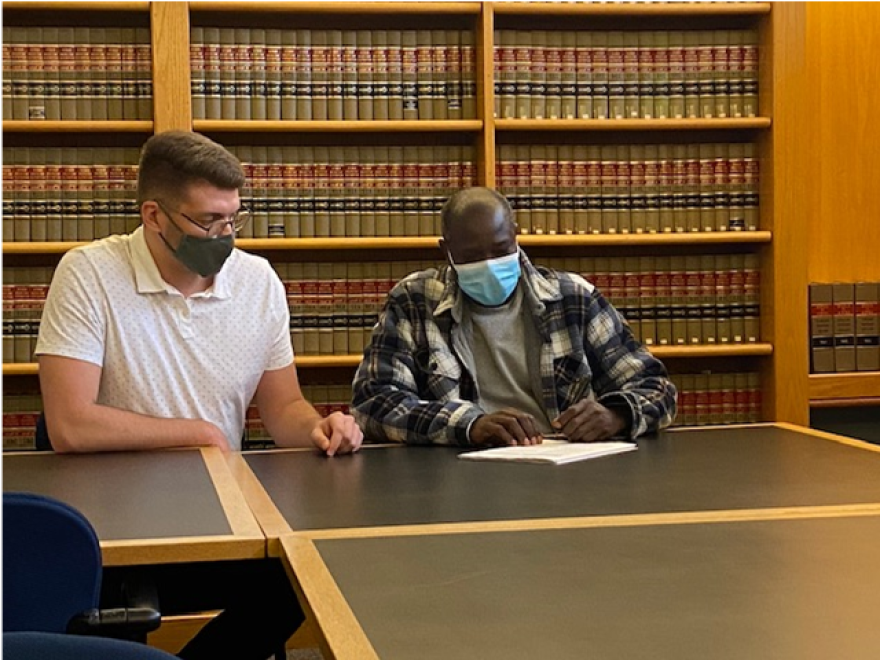Many Afghans who arrived in Iowa after their country’s fall to the Taliban still don’t have a clear path to permanent residency in the United States.
Several Afghan evacuees who escaped Kabul in August of last year came to the U.S. as humanitarian parolees – meaning they were granted two years to live and work in the country. The fast-tracked immigration process allowed more than 900 Afghans to flee to Iowa. Now, local non-profits legal services are hustling to help Afghan parolees apply for a more permanent legal status in the United States.
The Iowa Migrant Movement for Justice and the Drake Legal Clinic are offering free legal services to Afghan refugees through monthly clinics. Volunteer attorneys will guide evacuees on how to apply for temporary protection status or asylum, in order to extend their residency.
“The fact is everyone deserves due process and everyone deserves this level of help."Erica Johnson, executive director at Iowa MMJ
Without this legal counsel, Iowa MMJ legal director Ann Naffier said Afghans could face the risk of deportation back to Afghanistan.
“We have Afghans who were paroled in, who were air-lifted in from Kabul, who have parole, but may not qualify for any of the other programs that are available to Afghans right now,” she said. “I mean we face the possibility of Afghan evacuees becoming undocumented at some point.”
The clinics, which begin this Saturday, will help ensure no Afghans fall through the cracks, Naffier said. She said it’s been a challenge to address the arrivals needs without any additional resources or funding.
“It is causing legal service agencies and Iowa MMJ especially to have to pivot from other work and other priorities,” Naffier said. “We are not abandoning any of our current clients that we already have…But we're definitely trying to deal with many, many hundreds of Afghan evacuees above what we were already doing.”
A strained system
Usually refugees arrive in Iowa already on a pathway to becoming full legal residents. But, the emergency circumstances in Afghanistan means each arrival is starting from scratch.
Director of the refugee clinic at Drake University Law School Suzie Pritchett said that the large number of evacuees has put a strain on the already stretched immigration legal services in the state.
“People are really desperate and want to help and want as much representation as possible,” Pritchett said. “And so I think it's just been so important for the community to bind together and really think about how we can use the resources we have.”

On top of that, Pritchett said it’s often a challenge to communicate the often long and complex American immigration process to new arrivals from different cultural backgrounds.
It’s the first time the organization is offering asylum clinics, because it's often an intense and vigorous application process, she said.
“It's all very confusing to deliver this information in a meaningful way in languages that are accessible to the Afghan arrivals,” Pritchett said. “It's been a challenge to do that from a really client centered, holistic way.”
While temporary protected status (TPS) would offer – as the name suggests – a temporary extension, being granted asylum opens up Afghan evacuees to apply for permanent residency. In addition, many Afghans may be eligible to apply for Special Immigrant Visas (SIV), a legal status reserved for evacuees who aided U.S. forces.
Each status has its own process and demands of proof. Many Afghan evacuees may be eligible to apply for more than one legal status. Pritchett said immigration attorneys are encouraging evacuees to apply for every status for which they’re eligible.
This summer, Iowa MMJ screened 178 Afghan clients in central Iowa on their legal options. It found that 157 evacuees were eligible for asylum, 89 for SIV and 173 for TPS.
“We would love to get individual attorneys for every single asylum applicant, but we think that might not be possible,” Naffier said. “And we know that asylum is very time sensitive.”
Federal, state support may be on the way
Organizations like Iowa MMJ are hoping to see the success of a piece of federal legislation that would ease the immigration process for Afghan refugees.
A bipartisan group of legislators introduced the Afghan Adjustment Act (AAA) into Congress in August. The legislation would allow the 76,000 Afghan evacuees to adjust their status to lawful permanent residency.
“It’s something that's really desperately needed right now,” said Iowa MMJ executive director Erica Johnson.
“It is causing legal service agencies and Iowa MMJ especially to have to pivot from other work and other priorities."Ann Naffier, legal director at Iowa MMJ
The legislation hasn’t received much movement. In past versions of the bill, some prominent Republicans, including Sen. Chuck Grassley, have brought up security concerns surrounding the vetting process for the Afghan arrivals.
Johnson said she believes these concerns have been rectified in the latest version, which requires additional vetting procedures to be established for applicants.
She doesn’t see the success of the standalone bill as likely, but Johnson said the relief for immigration legal services needs to come soon. She said Iowa MMJ doesn’t want to have to turn away any more clients.
“The fact is everyone deserves due process and everyone deserves this level of help,” Johnson said.
In the meantime, Johnson said refugee organizations are looking to state legislators for additional funding to address the needs of Afghans in Iowa. For the first time, a coalition of refugee rights organizations will be asking for the state to allocate funds toward legal immigration services.
“That's something that's never happened in the state of Iowa before. Other states have taken that path. And it's something that would really benefit refugees, evacuees in Iowa.”


